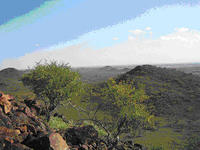Project INCO - ACACIAGUM - Innovative Management of Acacia senegal Trees to Improve Land Productivity and Gum Arabic Production in Arid and Semi-Arid Sub-Saharan Africa
Presentation
Introduction
Innovative Management of Acacia senegal Trees to Improve Land Productivity and Gum Arabic Production in Arid and Semi-Arid Sub-Saharan Africa

In the arid and semi-arid regions of Africa, land degradation and soil fertility depletion are considered to be the major threats for natural resource conservation and food security. A potential solution to land degradation is to promote the utilization, regeneration and planting of a native under-utilized legume tree: Acacia senegal , the main species in the world producing the internationally traded gum-arabic. This tree is very important for the livelihoods of many rural populations and has potential for wider use. Its incorporation into farming systems will diversify agriculture, enhance income generation and contribute to land improvement, soil fertility replenishment and biodiversity preservation.
In order to mitigate land degradation and enhance sustainability of farming systems, the overall objective of the proposal is to provide tools to promote use and sustainable management of A.senegal tree resources. The goal is to combine high gum quality and increased gum production with sustainable tree management.
The project will use a multidisciplinary approach focusing on: the socio-economic viability of the gum-arabic commodity chain under different tree management and/or site conditions (climate and soil type) on (1) tree eco-physiology and gum production; (2) tree genetics and gum quality and production; (3) biological soil-tree interactions and tree-crop interactions.
In a broad range of ecological, cultural situations and farming systems, the proposal will provide insights in the interactions between technological choice and multiple market issues including (eco)labeling for gum-arabic produced in different socio-economic settings characterized by community’s activities, resource access and control, market access and scale factors. The project will provide technical and institutional guidelines to enable investments in innovative management of A.senegal trees and gum for enhancing chain performance and reinforcing livelihoods of local producers.
Project Scientific Coordinator: Dr Didier LESUEUR
Project Financial Coordinator: Mr Patrick GUEZO
Project Administrative Coordinator: Mr Sloan SALETES
© CIRAD - 2008 - All rights reserved